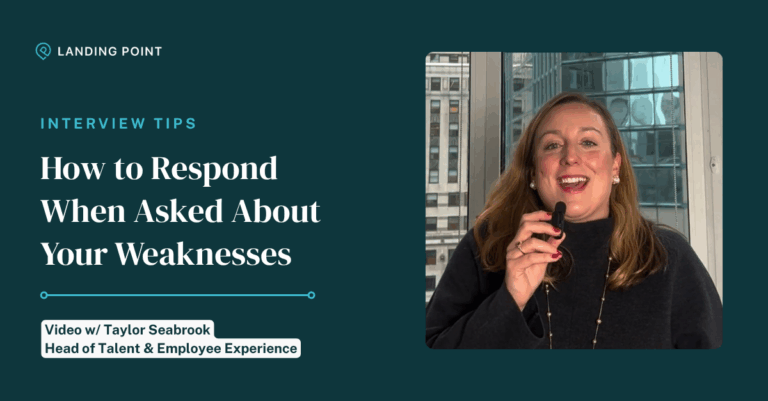By Taylor Seabrook, Head of Talent & Employee Experience
How Can I Answer This Question Honestly?
One of the toughest questions in an interview is: “What is your greatest weakness?” It often leaves candidates uneasy when trying to answer this because you want to be honest while presenting yourself in the best possible light. Striking the right balance is crucial, as your answer reveals self-awareness, maturity, and your ability to learn and grow within the organization.
In this video, Taylor Seabrook, Head of Talent & Employee Experience at Landing Point, shares practical tips for answering questions about weaknesses authentically, while also showcasing proactivity and professional development.
[Taylor Seabrook, Head of Talent & Employee Experience at Landing Point, explaining how candidates can answer questions about their weaknesses by being honest, structured, and demonstrating proactiveness in professional development.]
Key Takeaways
Be honest, but strategic — Select a weakness that is professional and relevant to the role, not something personal or unrelated.
Show self-awareness — Acknowledge areas where you’ve identified growth opportunities.
Demonstrate action — Highlight steps you’re taking or have taken to improve in that area.
Maintain authenticity — Avoid manufactured answers; genuine responses signal maturity and credibility.
Balance confidence with humility — Show that you can recognize challenges without undermining your capabilities.
Why This Question Matters
Interviewers ask about weaknesses not because they want to trip you up, but rather, they want to see self-awareness, accountability, and a growth mindset. Here’s how to approach it effectively:
- Structure your response: Identify the weakness, explain how you recognized it, and describe concrete steps you’re taking to improve. For past weaknesses, show how you’ve overcome them.
- Keep it professional: Avoid personal weaknesses unrelated to the role; focus on skills, processes, or areas of professional development.
- Highlight proactivity: Discuss resources, training, or mentorship you’ve leveraged to address the weakness. This shows initiative.
- Signal maturity: A thoughtfully crafted answer demonstrates emotional intelligence, professional maturity, and the ability to learn from feedback.
Related reading: Interview Preparation Tips for Junior Candidates
Ready to Ace Your Next Interview?
Properly answering questions about your weaknesses is an opportunity to demonstrate self-awareness, accountability, and a commitment to growth. By selecting a professional area for improvement, structuring your response thoughtfully, and highlighting the steps you’re taking to develop, you can turn a potentially tricky question into a chance to showcase maturity and initiative. With guidance and preparation, candidates can respond authentically while leaving a positive and lasting impression on interviewers.
Transcript
Taylor Seabrook:
One question that candidates tend to get stuck on, in my interviewing experience, is when you’re asked about your weaknesses, because it’s a little bit of a catch-22. On the one hand, you want to be honest, right? On the other hand, you’re constantly thinking, “I want to cast myself in the best light. Am I going to answer this appropriately and honestly? And is that going to ding me?”
I personally like when people are honest. I think if somebody asks you, “Where is an area that you need to improve?” it’s so easy to pinpoint and identify when that answer is manufactured and when it’s not authentic.
As an interviewer and as somebody who focuses on performance for the firm and how we think about improvement and training and resources for employees at Landing Point, when somebody’s honest with me and says, “Here’s something that I know I need to work on, either I identified it or my manager identified it, and here are the steps I’m actively pursuing to make sure that I improve upon it. Here are the resources I’m using.” Or even in past tense, “Here’s what I needed to improve, and here’s how I improved it.” I think it shows a sense of professional maturity.
I think it also shows a sense of proactiveness. Of course, there are parameters. You want to keep your area of improvement professional and relevant to the job that you’re applying for. But being authentic, honest, and structured in your thinking about how you reply is important.
About Taylor Seabrook
Taylor Seabrook is the Head of Talent & Employee Experience at Landing Point, where she oversees firmwide talent strategy, recruiting operations, and employee engagement initiatives. She partners with divisional leaders to identify and develop top talent, create performance frameworks, and foster a culture of growth and collaboration.
With more than a decade of experience in talent acquisition and higher education, Taylor brings both strategic vision and a people-first approach to Landing Point’s internal HR function. She previously led firm-wide recruiting at Viking Global Investors and served in admissions and advancement roles at Bowdoin and Brown Universities.
A graduate of Bowdoin College, where she studied Economics and served as captain of the women’s lacrosse team, Taylor is a champion of mentorship and team cohesion within Landing Point’s culture. She splits her time between New York and the Southeast, attending Clemson sporting events and spending time with her family and dog Crosby.

